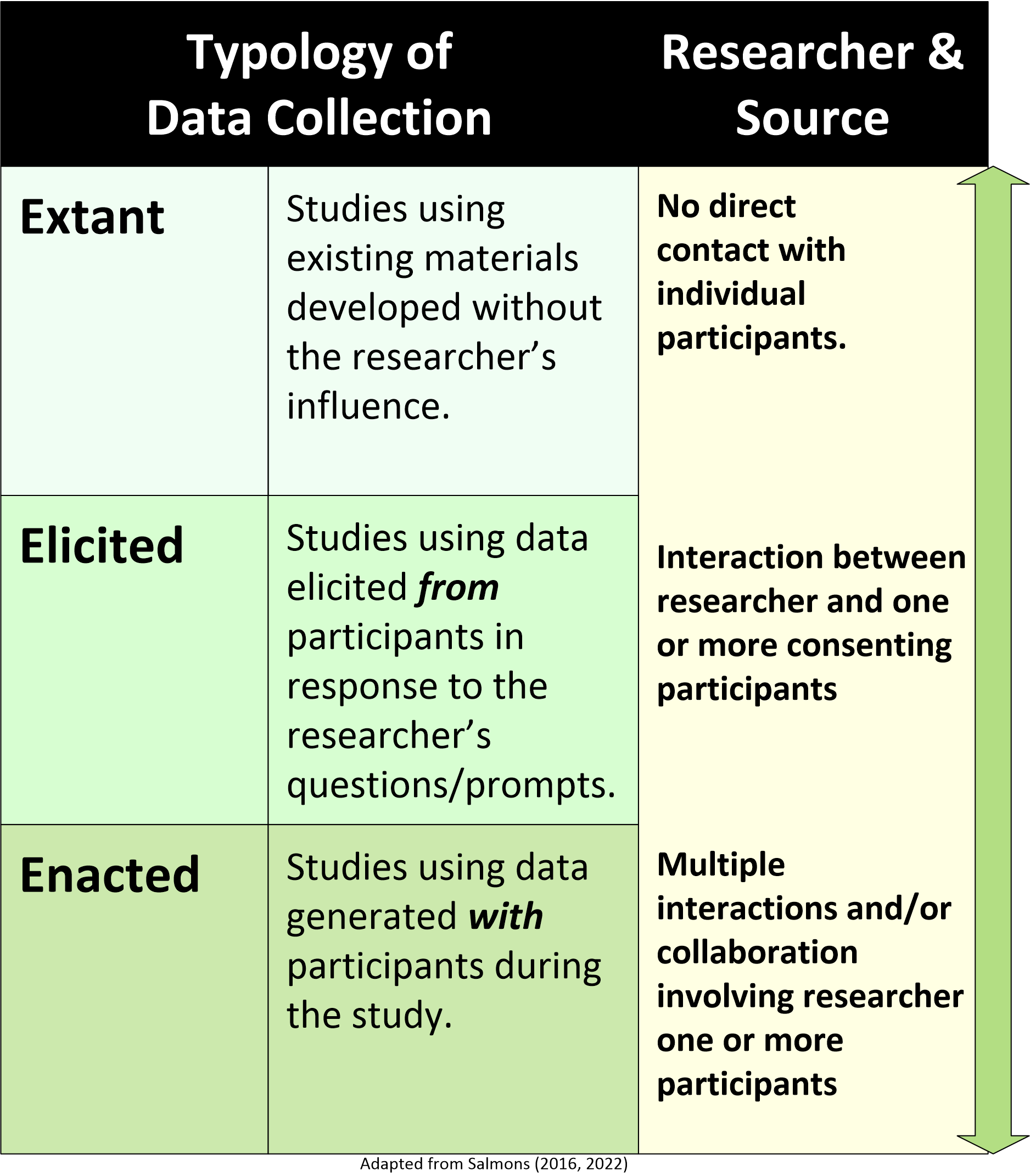Collect Data: The Q2 Theme
by Janet Salmons, PhD, Research Community Manager for SAGE Methodspace and author of books about research methods.
Let’s move to the next step of the research journey: Data Collection.
Research design was the focus for the first quarter of 2023; find the entire series here. Once we have a design and plan, we prepare to conduct the study. The next steps center on finding, collecting, and/or generating data.
Researchers know that these stages are iterative, rather than linear. At the design stage think about the data we need to fulfill the purpose of the study and answer research questions. When collecting data we often need to revisit decisions we made when we proposed the study. Nevertheless, it is a significant shift when we move from the thoughtful process of planning a study into the active stage of finding and/or generating data.
Data collection: sounds simple. It isn’t!
The term data collection makes it sounds easy. Like shells on the beach or wildflowers in a field, the data is out there, and as researchers all we have to do is collect it. In reality it is a careful, strategic, often collaborative effort. No matter what approach you choose, it is typically more labor intensive time-consuming than you anticipate. That said, it can be the most exciting part of a research project. A comment from an interview or a prescient insight from an article might stay with you for years to come.
How do we think about data collection in the context of our research?
Some methodologists categorize data as qualitative or quantitative to contrast words, stories, and pictures with numbers. The differentiation is rarely that stark. My first work-study assignment as an undergraduate involved coding a large body of narrative data, essentially translating stories into numbers. Quantitative researchers use visualizations and other ways to tell stories from numbers. Defining a polarity of words-versus-numbers is too imprecise to serve as the foundation for a collection strategy.
We will take a slightly different approach in the posts, interviews, and resources featured on Methodspace this quarter. We will look at data and their collection by source, relationships, and the role of the researcher. We will delve into these overarching questions:
Where is the data to be sourced? From people, documents, datasets, or other options?
What is the relationship of the researcher to the source of data, and what position does the researcher take?
These questions open the door to an exploration of the methods researchers can use to collect data, and the knowledge and skills needed to succeed in this venture.
Three broad types of data collection
To think the sources of data, let’s consider three broad types of data collection: extant, elicited, or enacted (Salmons, 2022).
Extant: This material was created for another purpose. Whether we are looking at historical materials in an archive, a data set constructed from a population census, or a set of social media posts, this material was developed by others. We had no contact with the people who created these data. Methods include meta-analysis, meta-synthesis, data or text mining, computational social science, discourse, narrative, or diary methods, or unobtrusive observation. The recent Methodspace series on review research exemplifies this type of inquiry by showing the potential for research conducted using published articles.
Elicited: If extant data is not adequate or specific to the purpose of the study we might want to ask questions or suggest prompts in order to collect responses from individuals or groups. Our roles and responsibilities change once we are in the position of relating to people, because we must ensure that they are fully informed about expectations for the study and have consented to be a part of it. Methods include interviews, focus groups, participant observation, or surveys.
Enacted: Sometimes we need to take a step beyond eliciting responses, and generate data with participants. Enacted methods of data collection entail in-depth activities with participants, typically with multiple interactions. Methods include formal experiments or longitudinal studies. Some options, such as action research or creative methods, involve participants as co-researchers.
Each type has advantages and disadvantages. Each has its own ethical considerations. Each relates to methodological paradigms. One is not better than another, your decision should be based on the alignment of data collection strategy with the overall purpose of the study, and the questions you hope to answer.
This quarter we will look at myriad examples, with attention to knowledge and skills, plans and preparation, positionality and responsibilities associated with each type. You will find cutting-edge thinking from contemporary researchers and tried-and-true methods from respected experts on Methodspace in Q2! Follow this tag to find this unfolding series.
Learn from experienced researchers in two webinars
Learn to understand and evaluate extant literature in the first webinar, and learn how to engage with stakeholders and participants for using elicitation and enacted approaches in the second webinar. Register now for these lively events:
Analyzing Published Literature Across Paradigms: How can you dig deeper into scholarly articles, especially when looking at literature from unfamiliar disciplines or methodologies? Join us for this useful webinar on April 18. With Dr. Helen Aveyard and Professor Morag Farquhar, co-authors of How to Read and Critique Research (2023), and Dr. Joan Dodgson, Editor Emerita of the Journal of Human Lactation and author of “What is a State of the Science Research Review?” (2023), and “Critical Analysis: The Often-Missing Step in Conducting Literature Review Research“ (2021)
Engaging with stakeholders: What can we learn from action researchers? Research has more impact when those directly involved have a voice in the process. This lively online panel discussion will offer the opportunity to learn how from experienced action researchers. Join us for this useful webinar on May 12. With Alfredo Ortiz Aragón and Ernie Stringer, co-authors of Action Research 5th edition (2020), and Rosalind Beadle, Research Fellow, Flinders University, College of Medicine and Public Health, Australia. See her discussion of “Women telling their own stories in action research.”



